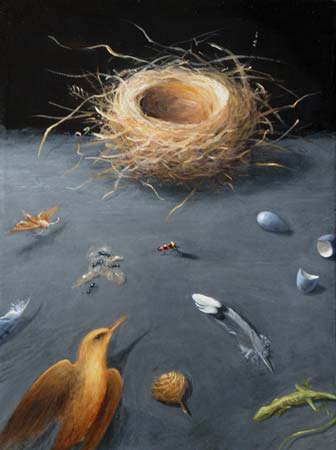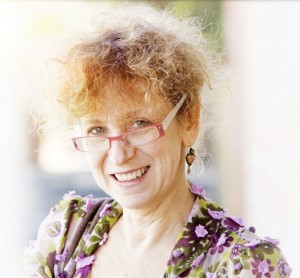Paul Zakrzewski: Your story Keep Smiling Mary K is a conversation, but one in the form of an internal dialogue between the narrator and a fitness instructor she sees on the TV. Meanwhile, her husband is absent, and the narrator may or may not have once spotted the fitness instructor in a Lebanese Café. But no conversation ensued. Can you say why your narrator seems so isolated?
Leah Kaminsky: I am interested in the idea of immigration being a sort of mini-death, a giving up of the self, of all that is known and comfortable and safe. The narrator is an ex-pat, who has transposed herself not only geographically and culturally, but has also left the sanctuary of a peaceful country and entered into a war-zone. In Australia she would have been free to be friends with Mary K from Lebanon, but now, she can only connect with her through the fitness instructor on the TV screen. She knows there is a like-minded woman across the border, a mother of children, in a hostile country, who she will never meet.
PZ: r.kv.r.y. is a journal dedicated to stories on the theme of recovery. Ostensibly, your narrator wants to “recover” her pre-pregnancy body…but clearly her heart’s not in it. To your mind, what’s the real thing she can’t or doesn’t want to recover from?
LK: She can’t recover from loss. The loss of security, self, home. She has crossed into the territory not only of war, but of marriage, immigration, motherhood – and she has never before had so much to lose. She has changed intrinsically because of all these experiences and can’t recover her innocence or naivete. So, the loss of weight, recovering who she was, is almost impossible now, as it is perhaps for those traumatized by war to recover from such a heavy burden of their collective past.
PZ: Leah, I’ve had the great pleasure both of reading a draft of your nearly completed novel, about a terrible day in the life of a physician in Israel. I’ve also heard you speak in public about “pain in literature.” In Keep Smiling Mary K, the voice of a TV aerobics instructor wants to be helping viewers. What is it about the uses (or abuses) of health professionals that interests you?
LK: Health professionals, like the fitness instructor in this story, can be proscriptive and reductionist in their approach to illness and well being. If you don’t listen to the narratives behind a patient’s concerns, you cannot hope to empathize or help in any meaningful way. You risk coming into the consultation with a preformed idea of how to conduct the interview and have the patent’s symptoms fit into a certain pro-forma.
Language is the first thing to be lost when it comes to pain and often you need to look for non-verbal clues. This is equally important when it comes to helping a patient express physical or emotional pain. Literature often uses fresh metaphors and narrative to help give voice and expression to pain. The truth is often in the subtext of what’s being said inside the consultation room.

PZ: Can you talk to me about how this particular story evolved for you? Was it always a “short” short story?
LK: Yes. It fell out onto the page just like this when I was living in Haifa, not long after the Gulf War. I had just moved there and was nursing my first child while watching TV. At the time the best shows were broadcast from Cyprus and I stumbled across a show called ‘Christian Aerobics’ – the idea for the story was born.
PZ: When I read your last line I thought of all those wonderful last lines I love in literature. The tricky switch of the pronouns in the last line of Virginia Woolf’s “Death of the Moth”: “O yes, he seemed to say, death is stronger than I am.” Then there’s the echoes of “weight” at the end of your story. Talk to me about last lines, what they’re supposed to do, what they can do.
LK: Perhaps they need to be like the final chord in a symphony, leaving the reader with the echo of the words in her head, long after the orchestra has left the stage and gone home. Some last lines are narrative crescendos, but I prefer stories that leave the reader with a diminuendo, that resonate long after she has closed the book.
PZ: I’m planning to launch a new blog where I interview writers I like on their “brilliant mistakes.” So you get to be my inaugural interview. Can you tell me about a particular mistake that led to an important insight, approach, or subject matter? A mistake that had a big positive impact on the way you approach your writing?
LK: Soon after I met my husband he introduced me to Israeli author David Grossman. We met in a café in Jerusalem and I told him I was nervous about moving to Israel because I was a writer and didn’t know any Hebrew. I asked him if I was making a career mistake. He told me there is no better place on earth for a writer to live – you just need to step outside your front door and there is always a story waiting there for you.
What I didn’t know then is that for the next ten years my writing career would be on hold, even though I’d learn the language, work and bring up children in Israel. But I couldn’t write creatively in Hebrew and there were very few opportunities to publish in English there – I think it was even frowned upon as a sign of not wanting to integrate into Israeli society in those days. I kept a journal all that time, but really thought my career as a writer was over.
When I moved back to Australia with my family after ten years, the words started to flow again and the experiences of living in Israel deeply informed my writing. David Grossman had been right about what he said; perhaps he wasn’t aware that the opportunities for writers in English when I lived there were narrow. At the time I thought moving to Israel would mean I could no longer be a professional writer, but I can see now how it fueled my muse in so many ways. Was it a mistake? No. I wouldn’t be the writer I am now if I hadn’t lived in such an edgy and colorful place for so long.
Paul Zakrzewski is a writer, teacher and literary curator who specializes in helping others to shape life stories in essays and memoir. He is the editor of Lost Tribe: Jewish Fiction from the Edge (Harper Perennial) and his essays, features and reviews have appeared in the New York Times, Boston Globe, Washington Post and elsewhere. He’s currently earning his MFA in Writing at the Vermont College of Fine Arts, where he is at work on an essay collection about second generation Holocaust identity, secrets, and hiding.


Pingback: Keep Smiling Mary K | Rkvry Quarterly Literary Journal
Pingback: Leah Kaminsky on David Grossman’s fateful advice | My Brilliant Mistake
Pingback: Keep Smiling Mary K | Rkvry Quarterly Literary Journal